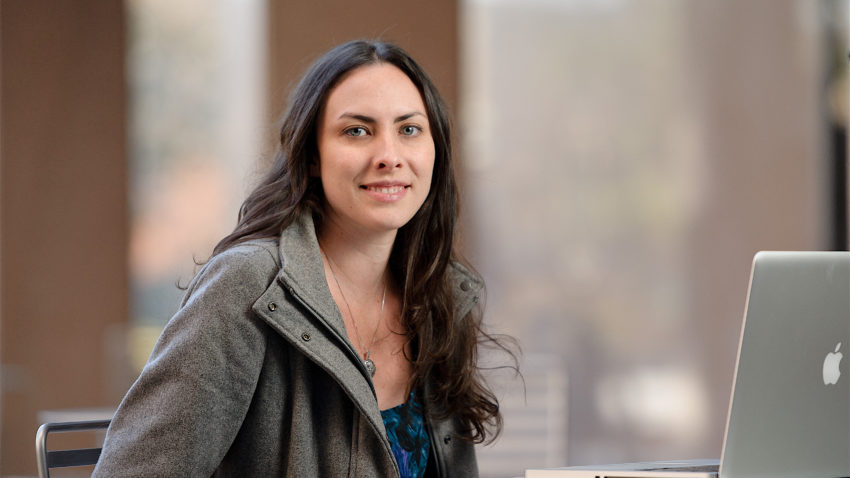This is the third installment of ADTSG’s student profiles feature!
These profiles are a way for the ADTSG membership to become acquainted with the next generation of anthropologists of alcohol, drugs, and tobacco. In this vein, each profile will introduce one graduate or undergraduate student to the group by asking him or her a series of questions related to his/her background and career aspirations in this field.
In this installment, we are profiling Allison Schlosser, MSW, a Ph.D. candidate in the Department of Anthropology at Case Western Reserve University. Allison is also the winner of this year’s ADTSG Graduate Student Paper Prize.
Why did you choose to study anthropology?
After my AmeriCorps term, I earned a Master of Social Work focusing on improving health and social services for people affected by drug use and poverty. During the first semester of my social work program, I took Introduction to Medical Anthropology as an elective. I had never taken an Anthropology class, but recently read Paul Farmer’s Pathologies of Power after randomly picking it up at a bookstore and wanted to know more about the discipline. Lee Hoffer, my current Ph.D. advisor and an anthropologist of illegal drug use, taught the class. I learned anthropological theories and methods for the first time in this course, and realized anthropology provided an ideal lens for me to draw on as I sought to better understand experiences of drug use and intervention holistically. As a social work researcher, I integrated qualitative and rapid ethnographic methods into my work. I found ethnography to be an invaluable tool in social work research and I felt most comfortable in the ethnographer’s role. This stance, particularly its “one down” positioning and non-judgmental listening, was powerful in the intervention contexts in which I worked: spaces where people often felt their voices were not heard or valued. Eventually, I decided to pursue doctoral education in Medical Anthropology to gain in-depth training in anthropological theories and methods. I find social work’s mission to promote social justice and anthropology’s focus on everyday life in cultural, political, and economic contexts an ideal combination to understand drug use among people whose experiences are often ignored or poorly understood.
Why are you interested in alcohol, drugs, and tobacco research?
I first became interested in alcohol, drugs, and tobacco research when I served as an AmeriCorps volunteer teaching elementary school in St. Louis, Missouri. The school where I taught was located in a zip code with one of the highest incarceration rates in the country at the time. Many of my students’ family members were incarcerated for drug-related charges. I saw how these circumstances affected students, their families, and the local community. I was particularly struck by seeing how families struggled to access basic healthcare and social services as they faced stigmas of drug use and socioeconomic marginalization. Getting to know these families in all their complexity underscored how thoroughly some people are defined by stigmas. I became interested in understanding how the full humanity of people who use drugs is often denied, the ways this denial intersects with other forms of marginalization, and the material, psychological, and social consequences of it.
What are your research plans for studying alcohol, drugs, and tobacco?
I am currently completing my dissertation on cultural constructions of addiction and recovery in the relation to political-economic shifts and increasingly biomedicalized treatment in the U.S. In this work, I use longitudinal ethnographic methods to examine client experience in and after residential treatment that merges biomedicine with psychological, 12 Step mutual aid, and juridical approaches. Specifically, I explore how clients who are socially positioned in diverse ways engage multiple beliefs and practices of “good” (moral) personhood in daily life where diverse understanding of the very meaning of addiction and appropriate recovery co-exist in tension.
As I complete my dissertation, I am beginning two new projects. The first project examines embodied subjectivity as people practice meditation—an increasingly popular intervention integrated into some treatment programs—alongside biomedicine and 12 Step. I am currently exploring research sites for an ethnographic study on treatment that integrates these diverse approaches. The second project examines media representations of opioid use in relation to lived experience. I am working with Lee Hoffer on a pilot study, “Using Photovoice to Capture Diverse Experiences of Cleveland’s Opioid Crisis,” that combines media analyses, visual participatory research methods, and ethnography to compare images of opioid use in popular media with photographs of daily life taken by people actively using opioids. This project focuses on understanding opioid use and overdose from the perspectives of people whose experiences are often obscured by media representations of drug use.
What do you hope to do after you graduate?
After I graduate, I hope to continue to study addiction concepts in healthcare, social services, and criminal justice systems. I am interested in research on how shifting healthcare policies and beliefs about opioid use influence service access and client experience. My goal is to engage in work in which theory and application inform one another. I aim to do research that not only informs policy and services, but also advances theories related to biomedicalization, subjectivity, and health inequalities. Additionally, I hope to teach courses on the anthropology of illegal drug use, addiction, and health inequalities for undergraduate and graduate students within and outside of anthropology (e.g., social work, medical, public health students). I see teaching that gives students tools to identify and critique assumptions about drug use, addiction, and interventions as an essential aspect of my applied work.
If you are a student and would like to be profiled for the ADTSG website, please contact ADTSG Student Liaison, Breanne Casper, at casperb@mail.usf.edu for more information!

